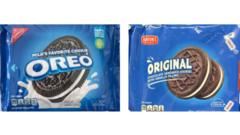In a significant court battle, Mondelēz International, the maker of Oreo cookies, has filed a lawsuit against budget supermarket chain Aldi in the U.S., alleging that Aldi has "blatantly" copied the packaging of its well-known snacks. The suit claims that Aldi's lookalike designs are intended to mislead consumers and take advantage of Mondelēz's established brand recognition and prestige.
Oreo Maker Mondelēz Sues Aldi Over Alleged Imitation of Packaging

Oreo Maker Mondelēz Sues Aldi Over Alleged Imitation of Packaging
Mondelēz International takes legal action against Aldi for mimicking its iconic Oreo packaging, claiming consumer confusion.
According to court documents, the snack conglomerate, which is also responsible for Wheat Thins, Nutter Butter, Chips Ahoy!, and Ritz, accuses Aldi of producing budget-friendly variants that mimic their packaging style. Although Aldi’s U.S. division has not responded to requests for comment on the lawsuit, a spokesperson for Aldi UK clarified that they are completely separate entities under the same ownership and are not involved in this matter.
The dispute began when Mondelēz filed the lawsuit in May after claiming to have contacted Aldi multiple times regarding the similarities in packaging. While some Aldi products received modifications or were discontinued, the lawsuit asserts that they continue to produce "unacceptable copies." Mondelēz claims that if Aldi is allowed to persist with these products, it risks causing "irreparable harm" to its brand reputation.
The legal complaint describes Aldi's business approach as primarily based on low-cost private label items that closely resemble established brands. The allegations against Aldi include trademark infringement, unfair competition, and unjust enrichment, with Mondelēz seeking damages.
Aldi, known for offering low-priced alternatives in over 2,500 U.S. locations, has faced legal challenges over similar trademark issues in the past. Earlier this year, the supermarket lost a case to Thatchers, a cider company that accused Aldi of duplicating its product in both taste and appearance.
The dispute began when Mondelēz filed the lawsuit in May after claiming to have contacted Aldi multiple times regarding the similarities in packaging. While some Aldi products received modifications or were discontinued, the lawsuit asserts that they continue to produce "unacceptable copies." Mondelēz claims that if Aldi is allowed to persist with these products, it risks causing "irreparable harm" to its brand reputation.
The legal complaint describes Aldi's business approach as primarily based on low-cost private label items that closely resemble established brands. The allegations against Aldi include trademark infringement, unfair competition, and unjust enrichment, with Mondelēz seeking damages.
Aldi, known for offering low-priced alternatives in over 2,500 U.S. locations, has faced legal challenges over similar trademark issues in the past. Earlier this year, the supermarket lost a case to Thatchers, a cider company that accused Aldi of duplicating its product in both taste and appearance.



















